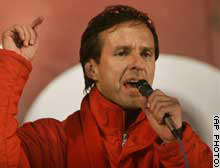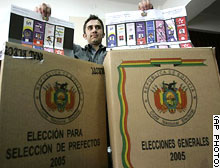 |
 |
 |
 News from Around the Americas | December 2005 News from Around the Americas | December 2005  
Bolivia Gears Up for Early Elections
 Simon Hooper - CNN Simon Hooper - CNN


| | Evo Morales would become Bolivia's first indigenous leader. | 
| | Quiroga is widely credited with having brought stability to the country. | 
| | An election official shows ballot papers and boxes. |
La Paz, Bolivia - As the governmental capital of a country supposedly on the brink of chaos, La Paz was surprisingly tranquil this week.

In Plaza Murillo, the ornamental heart of the city, crowds enjoyed the morning sunshine, more concerned by melting ice creams than the political meltdown predicted by some observers ahead of Sunday's Bolivian presidential election.

The election has arrived one year early, called by interim president Eduardo Rodriguez in June following the resignation of Carlos Mesa, who had complained that the country had become "ungovernable" amid popular protests over the privatization of Bolivia's natural gas reserves.

Mesa had himself assumed the presidency in October 2003 when his predecessor Gonzalo Sanchez de Lozada fled the country after efforts to break-up similar demonstrations ended in violence.

Both men were victims of a populist movement that has combined the grievances of Bolivia's indigenous majority, coca farmers and other left-wing groups to create an extra-political force capable of shutting down the country with road blocks and strikes.

Now, that movement is aiming to convert its momentum into real power by carrying Evo Morales, the leader of MAS, Bolivia's socialist party, to victory on Sunday.

Should they succeed, Morales - or "Evo" as friend and foe alike insists on calling him - would become the first indigenous leader of this Andean nation whose identity, more than any other in South America, remains grounded in the traditions and heritage of indigenous culture.

For the first time in their lives, many of the poorest citizens in the continent's poorest country believe that a government representing their interests is a real possibility.

"My vote is going to be for Evo because he's not a traditional politician,"said Rosina Mamani, an Aymara woman selling ornaments from a stall in Plaza San Francisco.

"He's one of us, he was born among us. Most politicians don't care about the poor. They follow the money, they're attracted to power like parasites."

Morales, a 46 year-old coca farmer turned political activist who is more comfortable in a poncho than a suit, has lead since the start of the campaign, with one poll published in the Correo del Sur newspaper on Wednesday predicting he will claim around 34 percent of the vote.

But, while that would likely be enough to win Sunday's popular vote, it is unlikely to be enough to catapult Morales to power. If no candidate achieves an absolute majority the outcome will be decided in Bolivia's congress.

Morales' main rival is the former president Jorge "Tuto" Quiroga of the social democrat Podemos party, currently polling 29 percent. Quiroga led Bolivia from 2001 to 2002, serving out the final months of Hugo Banzer's presidency after the ex-dictator was struck down by cancer.

A slick technocrat, Quiroga is widely credited with having brought stability to the country - something his supporters claim is desperately needed once more.

"This is a really important election for Bolivia's future and I am going to vote for Tuto," said Julio Espinoza, feeding the pigeons in Plaza Murillo. "He handled everything well when he was president before, even though it was only for a short time. I think he's going to do it properly again."

Polls suggest Podemos is likely to claim a larger share of congressional seats than MAS. If the fate of the presidency comes down to coalition building, Quiroga may also be able to count on the support of Samuel Doria Medina's Unidad Nacional (UN) party, currently running in third place.

Yet much remains in doubt. More than 11 percent of the electorate are still undecided, according to Correo del Sur, while Quiroga has said he will not seek the presidency if he fails to finish first on Sunday.

And while some Bolivians hope Sunday's election will provide an opportunity for a fresh political start, many others fear the current calm could only be the prelude to further disruption and uncertainty - with very few expressing confidence in the likelihood of Bolivia's next president serving a full five-year term.

"This is a difficult moment; a lot of people still don't know who they're going to vote for," said politics student Alejandra Belmonte.

"I'm worried about what's going to happen after the elections and I don't think the next government is going to last. Whoever wins, there's going to be trouble. I hope Bolivians will be strong and show the world that we respect our democracy." | 
 | |
 |



